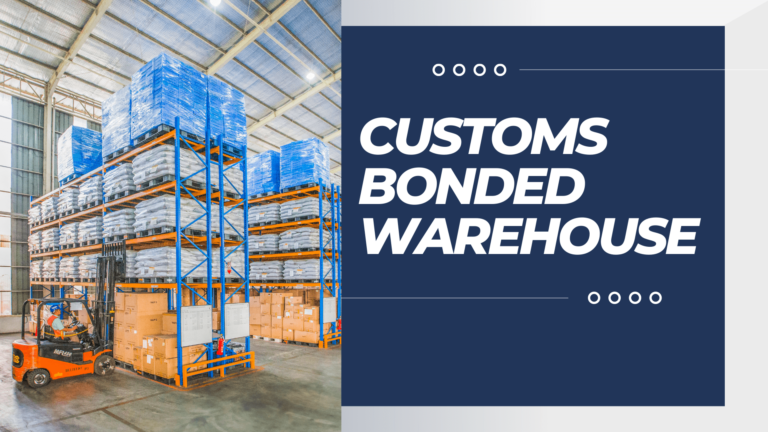OnePlus Nord CE4 Lite 5G (Super Silver, 8GB RAM, 128GB Storage)
₹17,998.00 (as of April 12, 2025 21:20 GMT +05:30 - More infoProduct prices and availability are accurate as of the date/time indicated and are subject to change. Any price and availability information displayed on [relevant Amazon Site(s), as applicable] at the time of purchase will apply to the purchase of this product.)Global trade is rapidly changing, and companies are always in search of strategies to improve their supply chains, cut costs, and increase effectiveness. Among the most efficient approaches to these objectives, it is possible to identify customs-bonded warehousing as the key one. This approach has many advantages, especially to the companies that are involved in the import and export business since they help in organizing their operations, postponing the payment of duties, and exercising better control over their stocks.
What is a Customs Bonded Warehouse?
A customs-bonded warehouse refers to a controlled area where imported goods may be stored for a specified period without payment of customs duty. These warehouses are under the supervision of the customs department and help maintain the compliance of goods that are in transit for domestic consumption, export or further processing. The storage of goods in a bonded warehouse also enables the business to delay the payment of duties and taxes on the goods until the goods are to be sold in the market. It offers vast monetary benefits and operational versatility; therefore, customs bonded warehousing is crucial for today's supply chain management solutions.
1. Financial Flexibility and Improved Cash Flow
The main advantage of bonded warehouses is the financial freedom that comes with them. Whenever goods are warehoused in a bonded warehouse, the business does not have to pay customs duties at the time. However, these payments can be made on an installment basis, that is after the goods are cleared for sale or distribution. This deferral can be especially advantageous for companies that import big quantities of merchandise because it helps to avoid cash flow problems.
By deferring duty payments, organizations can free up cash for other important areas such as advertising, innovation, or growth. This enhanced cash flow can indeed be a boon especially for SMEs who want to enter the global market arena. Furthermore, the flexibility of paying duty on a later date when goods are sold also means that companies are not financially trapped with unsold stock as the duty has to be paid upfront.
2. Enhanced Inventory Management
Customs bonded warehousing also provides the following benefits in the area of stocks: Companies can stock huge quantities of their stock in a bonded warehouse, which makes it easier for them to keep track of their stock. This is especially helpful for firms who receive large consignment of goods that are not used at once in the local market. These goods are stocked in a bonded warehouse, and they are only released into the market as required, hence minimizing costs such as those of holding excess stock.
Furthermore, bonded warehouses assure traders that their goods can be stocked for a long time without making daily or weekly duty payments. This enables the business to balance its stock with what the market demands, thus avoiding cases of having excess stock or no stock at all. It also allows businesses to stock their products for longer periods to wait for the right market conditions that will enable them to make good profits.
3. Facilitating Re-Exportation
Customs bonded warehousing is especially advantageous for companies that engage in international business since it enables the re-exportation of goods. Products that are kept in a bonded warehouse can be sold and shipped to other countries without paying duties in the country of the bonded warehouse. This makes bonded warehousing suitable for companies that trade across different markets and require some level of mobility for their inventory without incurring a lot of costs.
Exportation from a bonded warehouse is especially beneficial to firms that import goods with the aim of processing or repackaging them and then exporting them to other countries. These businesses can benefit from bonded warehouses because they can avoid the costs of paying duties on imported goods and again on exported goods. This is also beneficial to companies that handle products since they can stock them in a bonded warehouse until they are ready to export them.
4. Ensuring Security and Compliance
Security and regulatory compliance are two important aspects of international business, and trade and customs bonded warehouses are known for the best practices in these areas. These depots are under close supervision by the customs agencies to determine that all the stored goods meet the set requirements. This high level of security helps guard the goods against theft or damage and helps businesses avoid customs regulations and penalties, which can be expensive.
Bonded warehouses act as secure storage facilities and may also include services such as inspection, repackaging, and re-labeling. These services enable business organizations to conduct quality control tests and ascertain whether their products are fit for the market. This may be especially relevant to firms handling perishable goods, risky materials, or products that need specific handling conditions.
5. Strategic Advantages for 4PL Logistics Companies
To 4PL logistics companies, customs bonded warehousing is a value proposition that can be leveraged to improve services and increase customer satisfaction. Since 4PL logistics companies are supply chain integrators, they make the most of bonded warehousing, which is flexible and cost-effective. By integrating bonded warehouses into their supply chains, these companies can provide their clients with more efficient and cheaper solutions for handling their international shipments.
4PL logistics companies can use bonded warehouses to improve their clients' supply chains by offering them a single facility for storage, sorting, and delivery. This centralization of stocks shortens transit time, leading to low handling costs and making customs formalities more manageable. Furthermore, by holding goods without making duty payments right away, 4PL logistics companies can provide lower prices to their clients, which is another advantage.
6. Supporting Business Growth and Global Expansion
Customs bonded warehousing is a vital tool that is used in the support of business development and internationalization. For businesses considering expanding their markets and establishing warehouses in other countries, bonded warehouses are one of the most effective ways to deal with import/export. Bonded warehouses alleviate the problem of high costs of customs duties and provide a safe place for storing inventory, which means that it is easier for businesses to grow.
Furthermore, the application of bonded warehouses in the management of the supply chain can also assist a firm in managing against risks such as market volatility, exchange rate volatility, and changes in trade policies. The ability to store goods in a bonded warehouse helps companies wait until the right time to release products to the market, thus making the most out of their investments. Such an ability is particularly useful in the world of constant changes, which is the world of international business.
Conclusion
Customs-bonded warehousing is one of the most effective mechanisms that companies use in the management of their imports and exports, and it goes far beyond the basic concept of warehousing. From better control of cash flow and inventory to security and compliance, bonded warehouses offer the flexibility and cost efficiency required for business success in today's competitive environment. For 4PL logistics companies, the incorporation of bonded warehousing as part of their service portfolio can add more value to clients and make them a valuable partner in today's supply chain. As the challenges of global trading persist, the benefits of customs bonded warehousing will most certainly be instrumental in the success of the businesses.







0 Comments